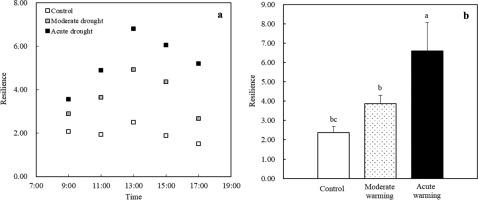Science of the Total Environment ( IF 8.2 ) Pub Date : 2020-11-23 , DOI: 10.1016/j.scitotenv.2020.144005 Hongying Yu , Xiaodi Liu , Quanhui Ma , Zuotian Yin , Yuhui Wang , Zhenzhu Xu , Guangsheng Zhou

|
Precipitation plays a vital role in maintaining desert ecosystems in which rain events after drought cause soil respiration (Rs) pulses. However, this process and its underlying mechanism remain ambiguous, particularly under climatic warming conditions. This study aims to determine the magnitude and drivers of Rs resilience to rewetting. We conducted a warming experiment in situ in a desert steppe with three climatic warming scenarios—ambient temperature as the control, long-term and moderate warming treatment, and short-term and acute warming treatment. Our findings showed that the average Rs over the measurement period in the control, moderate and acute warming plots were 0.51, 0.30 and 0.30 μmol·CO2·m−2·s−1, respectively, and significantly increased to 1.72, 1.41 and 1.72 μmol·CO2·m−2·s−1, respectively, after rewetting. Both microbial and root respiration substantially increased by rewetting; microbial respiration contributed more than root respiration to total Rs. The Rs significantly increased with microbial biomass carbon and soil organic carbon (SOC) contents. The Rs increase by rewetting might be due to the greater microbial respiration relying heavily on microbial biomass and the larger amount of available SOC after rewetting. A trackable pattern of Rs resilience changes occurred during the daytime. The resilience of Rs in acute warming plots was significantly higher than those in both moderate warming and no warming plots, indicating that Rs resilience might be enhanced with drought severity induced by climatic warming. These results suggest that climatic warming treatment would enhance the drought resilience of soil carbon effluxes following rewatering in arid ecosystems, consequently accelerating the positive feedback of climate change. Therefore, this information should be included in carbon cycle models to accurately assess ecosystem carbon budgets with future climate change scenarios in terrestrial ecosystems, particularly in arid areas.
中文翻译:

气候变暖增强了干旱生态系统中的土壤呼吸弹性
降水在维持沙漠生态系统中起着至关重要的作用,干旱后的降雨会引起土壤呼吸(R s)脉冲。但是,该过程及其潜在机制仍然模棱两可,特别是在气候变暖条件下。这项研究旨在确定R对再润湿的弹性的大小和驱动力。我们在沙漠草原上进行了三种气候变暖情景的原位加温实验:环境温度作为控制,长期和中度加温处理以及短期和急性加温处理。我们的发现表明,在对照,中度和急性升温区中,测量期间的平均R s为0.51、0.30和0.30μmol·CO 2。·m -2 ·s -1,并在重新润湿后分别显着增加至1.72、1.41和1.72μmol·CO 2 ·m -2 ·s -1。通过再湿润,微生物和根部呼吸均显着增加。微生物呼吸对总R s的贡献大于根呼吸。所述ř š与微生物生物量碳和土壤有机碳(SOC)含量显著增加。通过再湿润引起的R s的增加可能是由于更大的微生物呼吸严重依赖于微生物的生物量以及再湿润后大量的可用SOC。R s的可追踪模式白天发生了弹性变化。在急性增温区,R s的复原力显着高于中度增温区和无增温区的R s的复原力,这表明随着气候变暖引起的干旱严重程度,R s的复原力可能会增强。这些结果表明,气候变暖处理将增强干旱生态系统中的补水后土壤碳通量的干旱复原力,从而加速了气候变化的积极反馈。因此,该信息应包括在碳循环模型中,以准确评估陆地生态系统(尤其是干旱地区)未来气候变化情景下的生态系统碳预算。











































 京公网安备 11010802027423号
京公网安备 11010802027423号